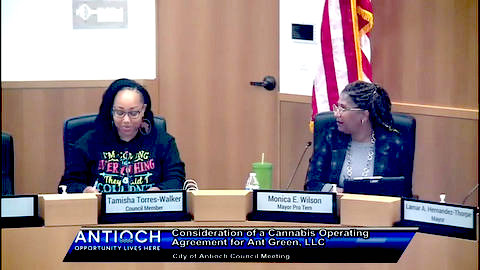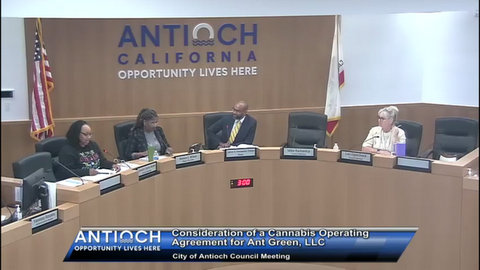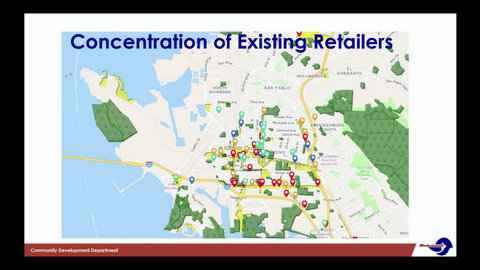
16 Aug New Antioch Cannabis Stores Required to Support Equity

“It’ll never be enough capital to atone for that harm,” said Antioch City Council member Tamisha Torres-Walker, left, referring to a program aimed at helping communities hurt by the War on Drugs. At right is Mayor Pro Tem Monica Wilson. (Screenshot captured by Samantha Kennedy / The CC Pulse)
By Samantha Kennedy
Antioch City Council approved two new cannabis retailers on Tuesday. And that means funding for a pair of nonprofits that address systemic barriers that Antioch residents who are Black, Indigenous and other people of color face.
The nonprofits are Bridge Builders to the New Generation, which serves more than 500 Black, Indigenous and other students of color in Antioch, and Monument Impact, which ensures immigrants, refugees and low-income residents have equitable access to wealth. They were chosen as part of a social equity program that requires approved cannabis retailers to support local nonprofits that serve communities disproportionately impacted by the War on Drugs.
In Antioch, “the reverberation of systemic oppression pervades,” Bridge Builders wrote in a letter attached to the city staff report, “ …through institutions like schooling, policing, housing, and healthcare.”
In the past, Antioch was known as a “sundown town,” the likes of which created all-white communities often through violence and racist laws.
“Antioch officially became a ‘Sundown Town’ when it banned Chinese residents from walking city streets after sunset,” according to a 2021 city resolution. Then, “in 1876, Chinese residents were told by white mobs that they had until 3 p.m. to leave Antioch — no exceptions.” And “after Chinese residents were forced out, Chinatown was burned to the ground.”
The city also disproportionately punished Black students, resulting in a lawsuit. More recently, a large portion of Antioch Police was pegged in a scandal involving racist, homophobic and violent text messages. The scandal has seen convictions brought into question and officers convicted, among other ongoing fallout.
‘Fire Everyone Who Is Racist’: Black Antioch Residents, Mayor React to Police Texting Scandal
The equity program is one of the city’s responses to the prejudice in Antioch’s past — and present. That 2021 resolution, which the City Council unanimously adopted, was a formal apology for “fundamental injustice” against early Chinese immigrants.
At Tuesday’s meeting, council approved operating agreements with the two cannabis retailers, one of which will also include manufacturing and cultivation, in two 3-1 votes with council member Lori Ogorchock voting against and council member Michael Barbanica absent. Applications for the retailers had been approved at previous meetings.
Council members appreciated an increase in funding for the nonprofits but acknowledged its limitations.
Funding “will almost never be enough based on the historical disenfranchisement and impact the War on Drugs have had on particular communities,” said council member Tamisha Torres-Walker. “It’ll never be enough capital to atone for that harm.”
Funding for Bridge Builders will go toward a “Generations Connect” program that will help Antioch youth develop life skills and cross-generational connections. Monument Impact’s funding will help support “Antioch Blooming: Women Rooted in Action,” a program that empowers 15 Black, Indigenous and other women of color by addressing social and economic barriers.
The retail locations for the operators — ANT Green and OTC Antioch — will be at 3625 E. 18th St. and 300 G St., respectively, and must provide a semi-annual report on each social equity program’s goals and outcomes to the city manager and city attorney. If requested, operators must also provide a presentation to council members.
While opinions differed on the facilities during public comment, some expressed concerns about the increased presence of cannabis in the community and how it might impact youth and public safety.
“The consequences to our community are beyond what you’re going to get,” said Ralph Hernandez, a former police officer, and added the addition of the facilities was “inviting a very bad element” to Antioch.
Torres-Walker acknowledged concerns that some may have about the impact the cannabis facilities could have on public safety, saying the facilities go through “an extensive review by the police department” before they go to approval from the Cannabis Standing Committee and the City Council.
“We haven’t had any issues related to public safety with these cannabis facilities,” said Mayor Lamar Hernandez-Thorpe, who mentioned one instance that started outside a facility and moved inside only to be “immediately shut down.”
The two retailers mean Antioch will now have five cannabis retailers across the city.
“I would like these operators — not just the ones we’re talking about tonight but overall — to have some type of community education component,” said Torres-Walker, “…to talk to communities and young people about the impacts of using cannabis.”
The next Antioch City Council meeting is Aug. 27.






No Comments